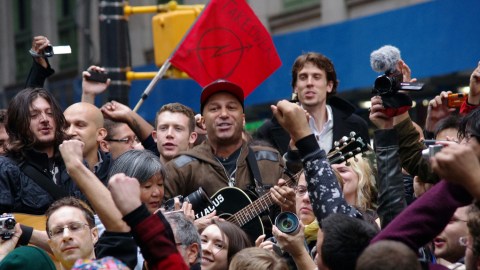Rawls, Radicalism and Occupy Wall Street: a Response to Wilkinson

Last Friday, I posted a piece in The Stone at The New York Times suggesting the work of philosopher John Rawls as an intellectual touchstone for the Occupy Wall Street protest movement.
The post has elicited a range of reactions. Of the 102 comments on the Times website, a handful offered ideas for what might be included in an Occupy manifesto, a few maintained that I mischaracterized the protestors’ aims or erred by putting Rawls side by side with the novelist and Tea Party favorite Ayn Rand. Many commenters offered ideas for alternative authors and texts to inspire the Occupiers: Marx, Nietzsche, Gandhi, Wallerstein, Lowi, Wolff, Habermas and Sandel, as well as the Declaration of Independence, the Preamble to the U.S. Constitution, the Book of Proverbs and the Golden Rule. Twenty or so comments expressed agreement that Rawlsian ideas should fuel the movement’s agenda.
And then there were a number of comments arguing that Occupy Wall Street doesn’t need Rawls and may not need any philosophical underpinning at all. For some, Rawls’s principles are “too radical” (no. 40, no. 60) because they put too much weight on the interests of the least advantaged. For others, Rawls is “not radical enough” (no. 62) because his theory calls for measly incremental policy changes that “already lay dormant in our constitutional republic.”
According to Will Wilkinson, who responded to my post at length on Monday, Rawls is more radical than I let on, and “generations of students” suffer from a misperception of what lies at the heart of Rawls’s theory. For Wilkinson, the most contentious move in Rawls’s theory is not the difference principle, according to which inequality is only justified if it maximizes the well-being of the least well-off. This idea, he writes, “follows almost trivially from the idea that our main institutions ought to tend toward the common interest and mutual benefit” and is “the least significant and probably least contentious” proposal Rawls makes.
Oddly, Wilkinson immediately refutes his own point by contending that the principle is “uncommonly and, I think, implausibly strong.” Rawls himself argued that the difference principle is not a “constitutional essential” because “issues of distributive justice…are always open to differences of opinion” that may be difficult to reconcile (Justice as Fairness: A Briefer Restatement, 48). Nevertheless, Wilkinson offers a different proposal for what counts as Rawls’s wildest move: his purported failure to include economic rights under the first principle of justice:
One might sensibly imagine that if all liberties matter, and that if citizens are to enjoy the most extensive liberty compatible with a similar liberty for others, then economic liberty must matter, and citizens ought to have as much of it as possible. However, Rawls specifically denies that robust economic rights and liberties are in any way implied by his first principle of justice. Economic liberties are not among our basic liberties. This is Rawls’ boldest claim.
Wilkinson both misreads Rawls and exaggerates the implications of his stance on economic rights. Rawls did include meaningful property rights among the equal basic liberties protected by the first principle, and the sensible limits he envisions for those rights are hardly radical.
To begin with the interpretive question, Rawls is clear that some property rights do count as fundamental and belong on the list of liberties protected by his first principle: “Among the basic rights is the right to hold and to have the exclusive use of personal property.” Rawls explains why:
One ground of this right is to allow a sufficient material basis for personal independence and a sense of self-respect, both of which are essential for the adequate development and exercise of the moral powers. Having this right and being able effectively to exercise it is one of the social bases of self-respect. (Justice as Fairness: A Briefer Restatement, 114)
Wilkinson is correct that Rawls excludes “the right to private property in natural resources and means of production” from protection under the first principle. But this does not mean the right is necessarily abandoned in a Rawlsian state. Rawls’s point is that the right to acquire and operate, say, oil fields and rubber factories, is not necessary for the development of an individual’s “moral powers” to pursue a meaningful life in concert with others. Nevertheless, they “may still be justified,” depending on the “historical and social conditions” at play in a given society. So these economic rights may well be protected in a Ralwsian state, as they are in the United States, but they do not rank as fundamental and should be decided legislatively – not entrenched constitutionally (JAF, 114).
If you’re swimming a bit in the Rawlspeak, let me translate: in order to lead a decent, free, happy life, everyone needs to know that their property in their homes, cars and iTunes libraries will be protected by the government. They are free to be secure in holding and profiting from “productive assets” (JAF, 139) like real estate, businesses and copyrights. But it is not obvious that property in natural gas drilling equipment or rainforests is fundamental to individual human flourishing, and there may be good reason to limit or regulate private ownership of such resources.
Now, it is clear why Wilkinson “might sensibly imagine” this nuanced stance on property rights to be “radical”: for libertarians, expansive versions of liberty of contract and rights to buy, hold and sell virtually all forms of property are at least as indispensable to a just society as are civil and political liberties like voting rights and the freedoms of speech, conscience and association. (Wilkinson has criticized GOP presidential candidate Ron Paul’s more extreme libertarian position that economic freedoms also take precedence over civil rights for racial minorities.)
But putting “robust” economic rights on the same pedestal as civil and political rights – or above them – hearkens back to the Lochner era of the early 20th century when the Supreme Court balked at Progressive Era and New Deal legislation to improve workers’ conditions in factories, establish a minimum wage or regulate child labor. This discredited era of robust economic rights ended in 1937, when the power to regulate business was returned to legislators’ hands.
The most instructive portion of Wilkinson’s post is his brief mention of “property-owning democracy,” the type of regime Rawls favors over both state socialism and welfare-state capitalism. Rawls decries the tendency of capitalism to “permit a small class to have a near monopoly of the means of production” and argues for a society whose institutions “work to disperse the ownership of wealth and capital, and thus to prevent a small part of society from controlling the economy, and indirectly, political life as well” (JAF, 139). Rawls thus shares the Occupy critique of the “1 percent.” But this is not anything approaching Marxism. A property-owning democracy permits, as its name suggests, the private ownership of property, and it employs markets to distribute goods and services.
Rawls pitches his typology at a high level of abstraction, so it is difficult to discern exactly how such a regime differs from the American model. But main distinction Rawls highlights is themed perfectly for Occupy Wall Street. Property-owning democracy guarantees “the widespread ownership of productive assets and human capital (that is, education and trained skills) at the beginning of each period,” rather than “the redistribution of income to those with less at the end of each period” (JAF, 139). The Occupy movement isn’t clamoring for cash handouts. It is urging the restructuring of society along lines that will eliminate the growing underclass and bring true equality of opportunity for everyone.
Wilkinson’s closing thought that “Rawls really does have to be watered down…to make him relevant to American politics” bears on a point several people made in response to my original post. As commenter no. 43 put it, “One doesn’t need an obscure philosophical theory to have a political movement.”
I am not proposing taking A Theory of Justice off the shelf and rallying under the weight of its 560 pages. In a democracy, this is not a role that political philosophy can – or should – play. Nor am I suggesting hollow slogans from a watered-down Rawls. I am observing that Occupy Wall Street’s justified anger with the status quo finds a rich philosophical friend in Rawls, and thinking carefully about his theory may help give the movement energy and direction as it continues to grow.





